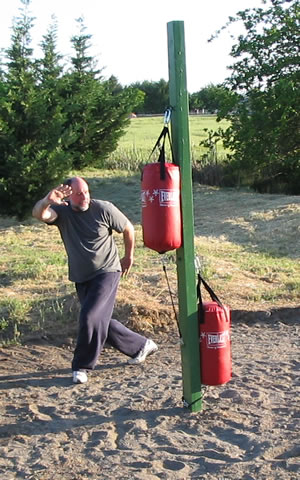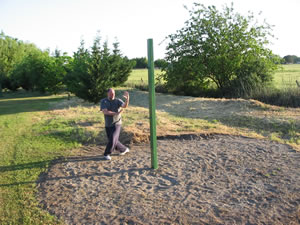Discourse on Great Blessings, Good Fortune
Discourse on Happiness
Mahamangala Sutta, Sutta Nipata, 2.4
Buddhist Scripture
"Not to be associated with the foolish ones,
to live in the company of wise people,
honoring those who are worth honoring –
this is the greatest happiness.
"To live in a good environment,
to have planted good seeds,
and to realize that you are on the right path –
this is the greatest happiness.
To have a chance to learn and grow,
to be skillful in your profession or craft,
practicing the percepts and loving speech –
this is the greatest happiness.
To be able to serve and support your parents,
to cherish your own family,
to have a vocation that brings you joy –
this is the greatest happiness.
To live honestly, generous in giving,
to offer support to relatives and friends,
living a life of blameless conduct –
this is the greatest happiness.
To avoid unwholesome actions,
not caught by alcoholism or drugs,
and to be diligent in doing good things –
this is the greatest happiness.
To be humble and polite in manner,
to be grateful and content with a simple life,
not missing the occasion to learn the Dharma –
this is the greatest happiness.
To persevere and be open to change,
to have regular contact with monks and nuns,
and to fully participate in Dharma discussions –
this is the greatest happiness.
To live in the world
with your heart undisturbed by the world,
with all sorrows ended, dwelling in peace –
this is the greatest happiness.
For he or she who accomplishes this,
unvanquished wherever she goes,
always he is safe and happy –
happiness lives within oneself."
- The Buddha, Mahamangala Sutta, Sutta Nipata, 2.4
Found in Chanting from the Heart, by Thich Nhat Hahn, 2002, p. 270
+++++++++++++++++++++++
For purposes of protection, safeguards, morning or evening prayers, or ceremonial sessions a poem, song, or scripture is recited or chanted (Paritta) by Buddhist devotees. One's favorite poems, songs, or scriptures were memorized, hand copied, or since 1700, available by purchasing printed collections for Paritta. The Mahamangala Sutta (Greatest Blessings or Greatest Happiness Scripture) is often read, reread, recited (Paritta) by Buddhist devotees and scholars; and, it is often found in many collections for Paritta.
Buddhist Scriptures My collections of Buddhist scriptures for rereading.
Chanting of the Maha Mangala (Blessings) Buddhist scripture.
Maha Mangala on UTube
Recommendations for Good Human Development and Behavior
Plum Village Translation of Maha Mangala Sutta
+++++++++++++++++++++++
Translation of Mahamangala (Blessings) translated from the Pali by Narada Thera, 1994:
"Thus have I heard.[1] On one occasion the Exalted One was dwelling at Anathapindika's monastery, in Jeta's Grove,[2] near Savatthi.[3] Now when the night was far spent, a certain deity whose surpassing splendor illuminated the entire Jeta Grove, came to the presence of the Exalted One and, drawing near, respectfully saluted him and stood at one side. Standing thus, he addressed the Exalted One in verse:
"Many deities and men, yearning after good, have pondered on blessings.
[4] Pray, tell me the greatest blessing!"
[The Buddha:]
"Not to associate with the foolish,[5] but to associate with the wise; and to honor those who are worthy of honor — this is the greatest blessing.
To reside in a suitable locality,[6] to have done meritorious actions in the past and to set oneself in the right course[7] — this is the greatest blessing.
To have much learning, to be skillful in handicraft,[8] well-trained in discipline,[9] and to be of good speech[10] — this is the greatest blessing.
To support mother and father, to cherish wife and children, and to be engaged in peaceful occupation — this is the greatest blessing.
To be generous in giving, to be righteous in conduct,[11] to help one's relatives, and to be blameless in action — this is the greatest blessing.
To loathe more evil and abstain from it, to refrain from intoxicants,[12] and to be steadfast in virtue — this is the greatest blessing.
To be respectful,[13] humble, contented and grateful; and to listen to the Dhamma on due occasions[14] — this is the greatest blessing.
To be patient and obedient, to associate with monks and to have religious discussions on due occasions — this is the greatest blessing.
Self-restraint,[15] a holy and chaste life, the perception of the Noble Truths and the realisation of Nibbana — this is the greatest blessing.
A mind unruffled by the vagaries of fortune,[16] from sorrow freed, from defilements cleansed, from fear liberated[17] — this is the greatest blessing.
Those who thus abide, ever remain invincible, in happiness established. These are the greatest blessings."[18]."
++++++++++++++++++++++++
Translation and commentary by Dr. R. L. Soni in 2006 of Maha Mangala (Life's Highest Blessings) :
"Thus have I heard:
Once while the Blessed One was staying in the vicinity of Saavatthi, in the Jeta Grove, in Anaathapi.n.dika's monastery, a certain deity, whose surpassing brilliance and beauty illumined the entire Jeta Grove, late one night came to the presence of the Blessed One; having come to him and offered profound salutations he stood on one side and spoke to him reverently in the following verse:
I
Many deities and human beings
Have pondered what are blessings,
Which they hope will bring them safety:
Declare to them, Sir, the Highest Blessing.
(To this the Blessed One replied):
II
With fools no company keeping.
With the wise ever consorting,
To the worthy homage paying:
This, the Highest Blessing.
III
Congenial place to dwell,
In the past merits making,
One's self directed well:
This, the Highest Blessing.
IV
Ample learning, in crafts ability,
With a well-trained disciplining,
Well-spoken words, civility:
This, the Highest Blessing.
V
Mother, father well supporting,
Wife and children duly cherishing,
Types of work unconflicting:
This, the Highest Blessing.
VI
Acts of giving, righteous living,
Relatives and kin supporting,
Actions blameless then pursuing:
This, the Highest Blessing.
VII
Avoiding evil and abstaining,
From besotting drinks refraining,
Diligence in Dhamma doing:
This, the Highest Blessing.
VIII
Right reverence and humility
Contentment and a grateful bearing,
Hearing Dhamma when it's timely:
This, the Highest Blessing.
IX
Patience, meekness when corrected,
Seeing monks and then discussing
About the Dhamma when it's timely:
This, the Highest Blessing.
X
Self-restraint and holy life,
All the Noble Truths in-seeing,
Realization of Nibbaana:
This, the Highest Blessing.
XI
Though touched by worldly circumstances,
Never his mind is wavering,
Sorrowless, stainless and secure:
This, the Highest Blessing.
XII
Since by acting in this way,
They are everywhere unvanquished,
And everywhere they go in safety:
Theirs, the Highest Blessings.
Here ends the Discourse on Blessings."
+++++++++++++++++++++++++++++
Translation by Piyadassi Thera of The Maha Mangala Blessings Sutta:
"Thus have I heard:
On one occasion the Blessed One was living near Savatthi at Jetavana at Anathapindika's monastery. Now when the night was far advanced, a certain deity, whose surpassing radiance illuminated the whole of Jetavana, approached the Blessed One, respectfully saluted him, and stood beside him. Standing thus, he addressed the Blessed One in verse:
1. "Many deities and men longing for happiness have pondered on (the question of) blessings. Pray tell me what the highest blessings are.
2. "Not to associate with the foolish, but to associate with the wise, and to honor those worthy of honor -- this is the highest blessing.
3. "To reside in a suitable locality, to have performed meritorious actions in the past, and to set oneself in the right direction -- this is the highest blessing.
4. "Vast learning, skill in handicrafts, well grounded in discipline, and pleasant speech -- this is the highest blessing.
5. "To support one's father and mother; to cherish one's wife and children, and to be engaged in peaceful occupations -- this is the highest blessing.
6. "Liberality, righteous conduct, rendering assistance to relatives, and performance of blameless deeds -- this is the highest blessing.
7. "To cease and abstain from evil, to abstain from intoxicating drinks, and diligent in performing righteous acts -- this is the highest blessing.
8. "Reverence, humility, contentment, gratitude, and the timely hearing of the Dhamma, the teaching of the Buddha, -- this is the highest blessing.
9. "Patience, obedience, meeting the Samanas (holy men), and timely discussions on the Dhamma -- this is the highest blessing.
10. "Self-control, chastity, comprehension of the Noble Truths, and the realization of Nibbána -- this is the highest blessing.
11. "The mind that is not touched by the vicissitudes of life, [1] the mind that is free from sorrow, stainless, and secure -- this is the highest blessing.
12. "Those who have fulfilled the conditions (for such blessings) are victorious everywhere, and attain happiness everywhere -- To them these are the highest blessings."
+++++++++++++++++++++++++++
"What are the greatest blessings?
Not to serve the foolish,
But to serve the wise;
To honor those worthy of honor,
To seek out training from the skilled,
These are the greatest blessings.
To have a soul filled with right desire,
Pleasant words that are well spoken,
To support father and mother,
To cherish wife and child,
These are the greatest blessings.
To follow a peaceful calling,
To abhor and cease from sin,
To abstain from strong drink,
Not to be weary in well-doing,
These are the greatest blessings.
Reverence and lowliness,
To be long-suffering and meek,
Self-restrained and pure,
Eager to learn and improve,
This are the greatest blessings.
With the knowledge of the Four Great Truths,
Eightfold Path, and Wise Teachers ...
Invincible on every side
Is he who acts thus.
On every side he walks in safety,
fearless but not foolhardy,
calm but not cowardly;
And this is a great blessing."
+++++++++++++++++++++++++++++++++++


















